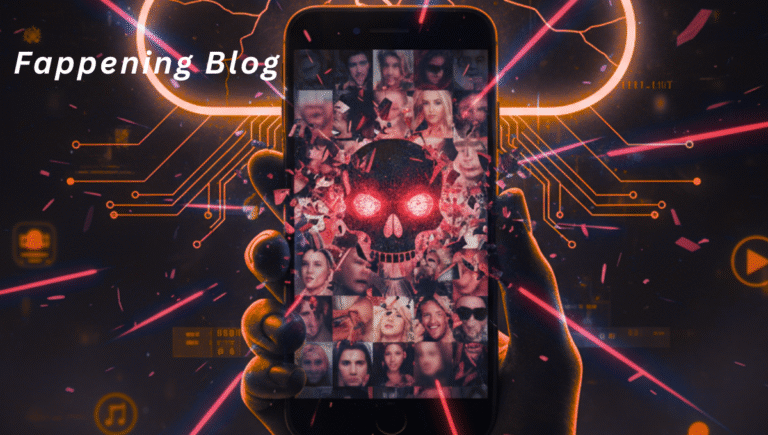The internet has witnessed several high-profile scandals, but few shook the digital world like “The Fappening” incident. At the center of this controversy was what many called the Fappening Blog—a site (and later, multiple copies of it) that hosted leaked private images of celebrities. While the name itself has faded in recent years, the incident remains a key discussion point in online privacy, cybersecurity, and digital ethics.
In this article, we’ll cover what the Fappening Blog was, how it started, the impact it had on celebrities and internet culture, and the important lessons it left behind for online users.
Understanding the Fappening Blog
The Fappening Blog was not a single official website but a term widely associated with platforms, forums, and blogs that circulated celebrity photos leaked during the 2014 iCloud hack. Hackers gained unauthorized access to Apple’s cloud storage system and stole private images of multiple high-profile celebrities, most notably Hollywood actresses and models.
The leaks quickly spread across the internet through:
-
Reddit threads
-
4chan boards
-
File-sharing platforms
-
Blogs dedicated to reposting the stolen content
One of these blogs became widely known as The Fappening Blog. Its sole purpose was to reshare the leaked pictures, making it infamous and controversial at the time.
The Origin of the Term “The Fappening”
The term “Fappening” is a mix of:
-
“Fap” – an internet slang word for self-pleasure.
-
“The Happening” – a 2008 Hollywood movie title.
While intended as a dark joke, the term quickly spread online and became shorthand for the massive celebrity photo leak scandal. The Fappening Blog simply adopted this name to attract attention, which boosted its popularity but also drew severe criticism.
Why the Fappening Blog Became Controversial
The controversy around the Fappening Blog had several layers:
-
Violation of Privacy – The celebrities targeted had their private, intimate photos stolen and distributed without consent. This was a direct attack on their digital security and personal dignity.
-
Legal Issues – Sharing hacked photos is a serious offense, violating copyright, privacy, and sometimes even cybercrime laws. The FBI launched an investigation, and several hackers were later prosecuted.
-
Moral Debate – While some internet users justified viewing the leaks under the excuse of “celebrity culture,” others argued it was a clear example of victim-blaming and internet exploitation.
-
Media Sensationalism – Mainstream media outlets fueled the scandal by covering it extensively, indirectly increasing awareness and traffic to sites like the Fappening Blog.
Impact on Celebrities and Society
The scandal had long-lasting consequences both for the victims and for the broader online community:
-
Emotional and Professional Toll – Celebrities such as Jennifer Lawrence, Kate Upton, and Kirsten Dunst spoke publicly about the trauma they faced. Lawrence described it as a “sexual violation.”
-
Increased Awareness of Cloud Security – The incident pushed Apple and other tech giants to improve their cloud storage protection, introducing features like two-factor authentication (2FA) and stronger password recovery systems.
-
Cultural Shift in Digital Privacy – The scandal sparked global conversations about revenge porn laws, data privacy rights, and the responsibilities of platforms in preventing the spread of leaked material.
Legal and Ethical Fallout
Authorities cracked down on individuals responsible for the hack. Several hackers were identified, arrested, and sentenced to prison. These legal actions highlighted:
-
The seriousness of hacking private accounts
-
The consequences of redistributing stolen material
-
The need for stronger cyber laws to protect individuals online
Ethically, the Fappening Blog raised important questions about:
-
Where does curiosity cross into exploitation?
-
Should users who view or share leaked material face accountability?
-
How can we balance free speech with digital safety?
The Fate of the Fappening Blog
Today, the original Fappening Blog is largely defunct, though mirror sites and copycats still exist. Most are blocked by search engines or removed due to copyright and privacy violations. Attempts to resurrect the blog have been met with heavy criticism and legal pressure.
However, the name lives on as a reminder of one of the internet’s most infamous scandals.

Lessons Learned from the Fappening Scandal
The Fappening Blog serves as a warning for both celebrities and everyday internet users. Here are some key takeaways:
-
Strengthen Account Security
-
Always use strong, unique passwords.
-
Enable two-factor authentication on all cloud accounts.
-
-
Understand Cloud Vulnerabilities
-
Cloud storage is convenient but not invulnerable.
-
Regularly review account activity and security settings.
-
-
Respect Online Privacy
-
Sharing or viewing stolen material makes you part of the problem.
-
Treat digital content with the same respect as physical privacy.
-
-
Push for Stronger Cyber Laws
-
Governments must enforce stricter penalties against hackers.
-
Victims should have more legal recourse against exploitative websites.
-
Final Thoughts
The Fappening Blog may be history now, but its impact continues to shape conversations around cybersecurity, online ethics, and digital privacy. It showed how vulnerable even the most high-profile individuals can be in the digital age and emphasized why protecting personal data is more important than ever.
As internet users, the biggest lesson is clear: just because something is online doesn’t mean it’s fair game to share or consume. Respecting privacy and practicing safe digital habits are responsibilities we all share in today’s connected world.
